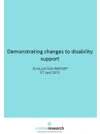This report, written towards the end of the three-year demonstration of the New Model for Supporting Disabled People, draws on information to assess the extent to which the components of the New Model have contributed to increasing choice and control for disabled people over the way they live and the support they receive. It also considers whether Choice in Community Living and Local Area Coordination can be implemented in a fiscally neutral way.
The concepts of Choice in Community Living and Enhanced Individualised Funding were indicated as sound mechanisms for increasing choice and control of supports. As a result people using these new supports were learning new skills, had greater independence, noticed a shift in the balance of power and had more connection with their community.
As well as describing how the new supports are working, the report identifies learning from demonstration of the New Model and implications for wider implementation. All of the components were still in the early stages of implementation and this placed some limitations on the ability to effectively analyse and draw conclusions, particularly in the area of fiscal neutrality.
The report points to the benefit of more time and changes to the wider system needing to occur, with these then having the potential to show the real benefits of these new supports.
The evaluation was conducted by Evalue Research. The evaluators interviewed 63 disabled people and whānau who were using one or more of the new supports and 28 stakeholders. A scan of literature was also undertaken and assessment of data from a variety of sources.

